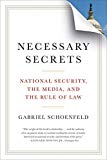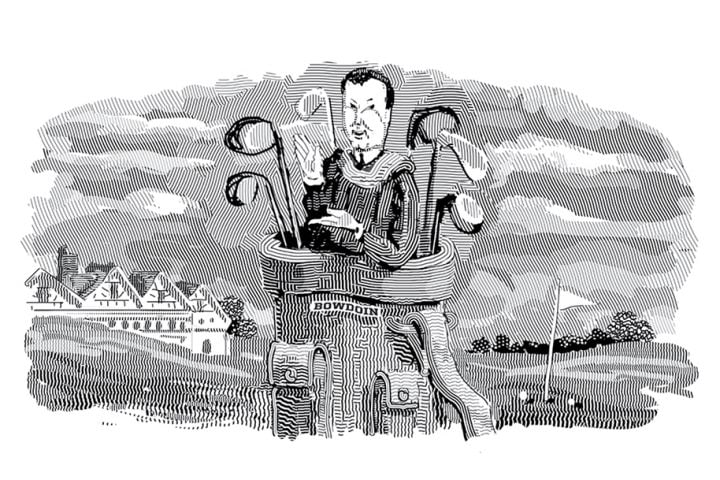Books Reviewed
A review of Necessary Secrets: National Security, the Media, and the Rule of Law , by Gabriel Schoenfeld
, by Gabriel Schoenfeld
The standard case for free speech makes transparency one of the nation's core principles. It holds that, outside of exceptional circumstances like yelling "Fire!" falsely in a crowded theater, an unconstrained marketplace of information and ideas is indispensible to the health of the republic. So great is the value of openness, in this view, that those who participate actively in that marketplace, especially journalists, perform work that is nothing short of heroic.
This romantic view of the supposedly high-minded journalists has a number of judicial sources. In the Supreme Court's 1971 "Pentagon Papers" decision, for example, Justice Hugo Black wrote that "far from deserving condemnation for their courageous reporting," those who published information stolen from the government "should be commended for serving the purpose that the Founders saw so clearly." For almost a century the Supreme Court has worked from the assumption that judges should stand as a bulwark against efforts to restrict speech alleged to be harmful, because both the general public and its political representatives often yield too easily to the urge to suppress.
The starting point for Necessary Secrets by Gabriel Schoenfeld is that this set of ideas has become—of all things!—a stale orthodoxy. And in the great tradition of open debate, Schoenfeld sets out to challenge that orthodoxy, at least as it applies to national security. Formerly a senior editor for Commentary, and currently a writer affiliated with the Hudson Institute and the Witherspoon Institute, Schoenfeld weighs the often competing claims of efficacious government and informed democracy in a careful, fair, but sometimes hard-hitting way.
According to Schoenfeld, founders as different as George Washington and Patrick Henry stopped well short of being free-speech absolutists. They thought that governmental secrecy is sometimes necessary, especially in military affairs—but not only. The proceedings of the Constitutional Convention of 1787, for example, were meant to be confidential, partly to allow participants to shift positions during the course of debate without public embarrassment.
Schoenfeld tries to vindicate the founders' belief that dire consequences will follow if the government is unable to keep secrets. During the Civil War, for instance, newspapers sometimes published advance news of planned troop movements, leading to unnecessary loss of life. In 1931 a high-level government code breaker named Herbert Yardley published a book revealing how much of Japan's secret code had been broken by the United States during World War I. (In addition, Yardley may have sold the information to the Japanese themselves.) Schoenfeld argues that the disclosure caused the Japanese to rework their codes, one of the reasons America was taken by surprise at Pearl Harbor.
Though observing that divulging military secrets can be an overt act that lends aid and comfort to an enemy of the United States, i.e. treason, Schoenfeld is no alarmist about the damage that leaks cause. He recognizes that sometimes the publication of even dangerous information might cause no immediate harm and possibly do some good. In December 1941, for example, the Chicago Tribune published an account of the Roosevelt Administration's secret plan to wage total war against Germany. This information soon came to Hitler's attention and may have been one of the factors that induced him to declare war on the United States. Schoenfeld calmly concludes that this turn of events was a "godsend" rather than a "calamity," since after Pearl Harbor Roosevelt would have been limited to waging war against Japan, the lesser threat to our security, if Hitler had not resolved this dilemma for him.
Schoenfeld also recognizes that the consequences of leaks can be subtle and indirect. The publication of the Pentagon Papers seems not to have caused any concrete harm to the American military effort in Vietnam, for example. Yet the very fact that the United States could not prevent disclosure of its secrets might have damaged diplomatic relationships.
Although courts fixate on whether leaked information can be shown to be immediately dangerous, Schoenfeld argues that a leak can put lives in danger through a gradual sequence of events. Moreover, "damage…will always be an exercise in indeterminacy." Those who wish to harm us are themselves engaging in concealment, so the idea that we can knowledgably calibrate the marginal increase in our vulnerability caused by the divulgence of particular secrets is specious.
Schoenfeld sensibly observes that if the threat is grave enough, like the publication of information that would make it easier for a hostile nation or terrorist group to build a thermonuclear bomb, even a small likelihood of real world consequences would be intolerable. Moreover, as was true with the improved Japanese codes that made the attack on Pearl Harbor harder to prevent, dreadful consequences can take place many years after secrets are disclosed. Finally and importantly, he emphasizes the harm done to self-government when the legitimate representatives of the people decide what should not be disclosed but a midlevel bureaucrat takes it upon himself to subvert that decision.
* * *
Speaking of midlevel bureaucrats, wasn't Daniel Ellsberg, the leaker of the Pentagon Papers, a First Amendment hero? Not according to Schoenfeld. If the leak did no specific harm, neither did it do much to hasten the end of the war. And Ellsberg, rather than stepping up to take the punishment for his civil disobedience, tried to remain anonymous and to evade authorities. He was, says the author, "a rogue."
Schoenfeld is harder on other leakers, condemning CIA operatives who disregarded their oaths by disclosing classified information and depicting the Progressive magazine's decision in 1979 to publish details on the construction of a thermonuclear bomb a dangerous, "puerile" self-indulgence. In 2005 the New York Times ran its story on the National Security Administration's Terrorist Surveillance Program after one of the authors, James Risen, threatened to publish his book on that subject and thus scoop the newspaper. Since the paper's publication of the story provided Risen's book with valuable publicity, Schoenfeld concludes that a reporter benefited financially from a news event that "compromised American security." The Times had some colorable journalistic pretext for proceeding with the NSA wiretapping story, but, according to Schoenfeld, its subsequent decision to publish a story about the Bush Administration's bank monitoring program, a highly successful and legal anti-terrorist program, proceeded from the "frivolous justification" that the story was (in the words of the reporter) "an interesting yarn."
Given the dogma that government is a constant threat to vigorous free expression, readers may be surprised to learn that most leaking goes unpunished. Readers may also be surprised to learn that much of this forbearance is due to political, not judicial, decision-making. Schoenfeld reports that the United States has sought to block publication of secrets (through what lawyers call "prior restraints") only twice. One attempt, of course, involved the Pentagon Papers and the other theProgressive article on the construction of nuclear weapons. The Justice Department lost the former case and dropped the latter when other news outlets published the same material. When Frank Snepp tried to publish an account of the last days of the Vietnam War-an account that contained information gained while he was a CIA agent—the Justice Department refused to seek a prior restraint, instead going after his profits. The government argued successfully that Snepp had not honored his contractual agreement to submit such material to the CIA for review.
Perhaps more surprisingly, Schoenfeld claims that between 1917 and 1985 only twice did the United States attempt to use the Espionage Act against individuals who leaked secrets. The first target was Ellsberg, who was brought to trial in 1973; prosecutors dropped the charges when aspects of the Watergate scandal began to become public. The second was Samuel Morison, an intelligence analyst with top-secret clearance. Morison sold secret photographs of the Soviet Union's first nuclear powered aircraft carrier to Jane's Fighting Ships. He was convicted, but sentenced to only two years in prison. President Bill Clinton later pardoned him.
Both Ellsberg and Morison worked for the government when they obtained their secrets. The first prosecutions of private individuals under the Espionage Act did not occur until 2006. According to Schoenfeld, there have been only three successful prosecutions for leaking classified information in American history. Not only has prosecution been rare, but journalists, who can be subpoenaed to appear before federal grand juries and be made to identify leakers, are rarely required to appear because of the Justice Department's strict internal guidelines.
* * *
While Schoenfeld appreciates that governmental efforts to suppress speech have at times been excessive, he thinks the government would do well to increase its efforts to punish leakers of national security secrets. Indeed, he seems to relish one often-overlooked aspect of the Supreme Court's decision in the Pentagon Papers case. Though the Justices denied the Nixon Administration's request for an order preventing the New York Times from publishing, a majority also pointed a "fully cocked gun" at the press. Schoenfeld refers to Justice Byron White's observation that the Times might be subject, after publishing, to criminal prosecution. Schoenfeld does not recommend firing this gun indiscriminately. He thinks that the public's need for information and the government's need to keep secrets can be reconciled if federal prosecutors use their discretion wisely and "seek to punish the publication only of those secrets that truly endanger national security."
This proposal is not entirely satisfactory. The author's own analysis shows how difficult it is to know whether the publication of particular secrets will harm the nation. If prosecutors are directed to limit themselves to moving against leaks that "truly" endanger security, they will be required to know more than anyone can know.
Moreover, focusing on prosecutorial discretion does not solve the problem represented by the federal judiciary, which would stand between the decision to prosecute and the decision to punish. With few exceptions, federal judges accept the same free speech orthodoxy that Schoenfeld condemns in journalists. Indeed, much of that orthodoxy has been fostered and legitimized by the federal courts. No stronger or more romantic account of the founders' beliefs about the virtues of unbridled free speech can be found than Justice Louis Brandeis' lyrical, influential, and simplistic concurring opinion in the 1927 Supreme Court case, Whitney v. California. Brandeis's opinion is one of several judicial sources for the view, common among both justices and journalists, that dangerous speech cannot be punished unless the threatened harm is concrete and imminent.
Gabriel Schoenfeld's logic points inevitably toward the conclusion that legal cures for irresponsible leaking are unlikely to be significant. The cure, if any, must come from changes in the larger political culture. In place of a widespread set of attitudes and assumptions that fosters self-indulgence and irresponsibility among leakers and journalists, he argues for a more mature, thoughtful ethos. Necessary Secrets is an important step in that direction.




